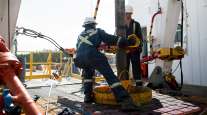OPEC+ Meets to Seek Compromise on Plan to Delay Output Hike

[Ensure you have all the info you need in these unprecedented times. Subscribe now.]
OPEC+ began two days of potentially complicated talks to hash out the size of its oil-production cuts next year, with the group’s president calling for caution in a fragile market.
The coalition that pumps half the world’s crude is debating whether to maintain its output restrictions at current levels by deferring the increase scheduled for January. Some members are concerned that global markets remain too fragile to absorb additional barrels — particularly after Libya’s output soared — while others are keen to sell more crude.
As the online meeting got underway, the usual process of negotiating and counter-proposals was already in full swing. Producers held informal discussions on the evening of Nov. 29, when most of them had supported maintaining the existing curbs into the first quarter. But the plan didn’t get backing from two of the coalition’s major players: the United Arab Emirates and Kazakhstan, delegates said.
“We must be aware today that the market conditions of 2020 are likely to continue during the first quarter of 2021,” Algerian Energy Minister Abdelmadjid Attar, who holds OPEC’s rotating presidency, said at the start of talks. “We must be cautious.”
Indicating a preference for a delay, he was then quoted by Algeria’s state news agency saying there was consensus, and he was optimistic there would be an agreement on a first-quarter extension.
How did turkey-to-table change this year? What obstacles were suppliers going through to get turkeys to grocery stores? Join us as we talk with J.J. Smith, President of Valley Proteins, about how staying open-minded and flexible helped his business of delivering turkeys persevere. Hear a snippet, above, and get the full program by going to RoadSigns.TTNews.com.
Market watchers have been expecting the cartel to agree on a three-month delay, but as the meeting grew closer the number of options under discussion proliferated. Two months also has been floated, as has the possibility of gradually increasing output over a three or four month period, delegates said, asking not to be identified because the talks were private. A couple of hours into the meeting, the option of a three-month delay was proposed, according to delegates.
Neighborhood Tensions
Tensions have emerged between the UAE and the Saudis, traditionally stalwart partners. Abu Dhabi has grown impatient to use its new production capacity, while also planning to launch a regional oil benchmark contract. The country hasn’t commented publicly on its stance, and officials said before the Nov. 30 meeting that they hadn’t decided on a position.
Kazakhstan is ready to discuss its position, according to a person familiar with the country’s oil policy. The Kazakh Energy Ministry declined to comment.
Several delegates predicted that OPEC+ eventually would find a compromise that works for everyone, as is usually the case for the group.
“There is still a broad desire within OPEC+ to balance the market, given additional Libyan supply and softer demand,” said Bill Farren-Price, a director at research firm Enverus. “While there are options on the table, there is no oven-ready deal.”
RELATED: Oil Advances to Eight-Month High on Demand Optimism
If that consensus can’t be achieved, the existing agreement allows members to add 1.9 million barrels a day to world markets, potentially derailing the recent rebound in crude prices. Brent futures are trading near $47 a barrel in London. Crude could fall by about $5 if OPEC+ doesn’t delay the production increase, according to Goldman Sachs Group Inc.
Uncertain Demand
OPEC+ made vast production cuts during the depths of the pandemic to offset a historic collapse in fuel demand. The alliance had planned to ease some of those curbs at the start of 2021, in anticipation of a global economic recovery. Over the past few weeks, leading figures in the alliance such as Saudi Energy Minister Prince Abdulaziz Bin Salman and Russian Deputy Prime Minister Alexander Novak have signaled support for delaying that supply increase.
While a breakthrough in vaccines to tackle the coronavirus propelled oil prices to an eight-month high, a resurgence in infections has triggered a new wave of lockdowns and inflicted a fresh blow to fuel consumption. The cartel and the wider industry have downgraded their outlooks for 2021, with a picture thats sharply polarized between recovery in Asia and stagnation in Europe.
Grumbling Members
Yet Abu Dhabi has so far withheld its blessing for a delay, with Energy Minister Suhail Al-Mazrouei repeating his position that many countries still haven’t implemented the supply cuts they’ve been obligated to make for months, delegates said.
That may have been a pointed reference to the Saudis’ treatment of the UAE during the summer, when Mazrouei was summoned to Riyadh and given a public rebuke for his own overproduction. The country has since delivered the required compensatory curbs, but other laggards such as Iraq and Nigeria haven’t.
The Emirates’ frustration flared two weeks ago, when officials signaled privately that they were dissatisfied with the quota assigned to them by OPEC, and were even contemplating leaving the organization in the long term. Iraq and Nigeria also have grumbled about their output limits.
“It won’t be an easy meeting,” Iranian Oil Minister Bijan Namdar Zanganeh told the Shana news agency. “Some are opposed to extending the previous decision, and this makes matters more difficult.”
Javier Blas, Dina Khrennikova, Grant Smith and Salma El Wardany were the primary contributors to this report.
Want more news? Listen to today's daily briefing:
Subscribe: Apple Podcasts | Spotify | Amazon Alexa | Google Assistant | More





